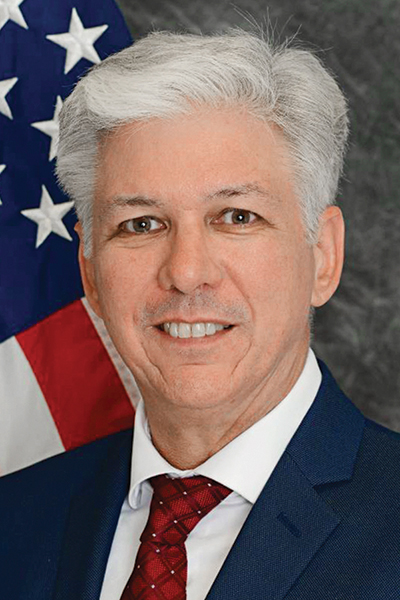Director’s Letter
V12N4
Welcome to the 48th edition of per Concordiam. This edition focuses on the ongoing impact that Russia’s invasion of Ukraine is having on the nature of strategic competition and on the shifting geopolitical power relations between key actors, such as Russia, China, India and Turkey, in different theaters, from the Arctic to the Middle East, to South and East Asia.
In the opening Viewpoint article, Marshall Center professor Dr. Graeme P. Herd and Matthew Funk, a researcher for the Munk School of Global Affairs, chart how post-Cold War contemporary strategic competition is still promoted through proxies, though the patron-client relationship has changed. Ukrainian diplomat Pavlo Troian addresses Russia’s “occupation” of Belarus, while Ukrainian political analyst Dr. Kseniya Sotnikova examines how donors continue to provide Ukraine with assistance despite Russia’s war of imperial aggression. Marshall Center professor Dr. Tova Norlén examines the war’s impact on Russian influence in the Middle East-North Africa region and its attempts to leverage the region’s vulnerabilities to exert influence.
Power relations among key actors are shifting. Falk Tettweiler, a Marshall Center researcher and analyst, sheds light on the Sino-Russian institutional axis. While Russia’s military forces are degraded daily fighting trench warfare in Ukraine, China aims for complete modernization by 2027, with an emphasis on informatization and intelligent integration of its armed forces. Despite its threats, Russia is unlikely to cross the nonstrategic nuclear weapons-use threshold, Pavel Baev, a Brookings Institution nonresident senior fellow, argues, in part because it needs to maintain strategic relations with China. U.S. Navy Cmdr. Rachael Gosnell and fellow Marshall Center professor Katrin Bastian explore the shift from Arctic “High North, low tension” exceptionalism to freezing Russia out of regional cooperation, which creates greater incentives for Russia’s dependency on China. Vinay Kaura, an assistant professor at Sadar Patel University in India, and Marcin Kaczmarski, a University of Glasgow lecturer, help unpack how the war in Ukraine has influenced the Russia-India-China strategic triangle, arguing that stronger Russia-China relations help India align with the West against China, if not Russia.
Russia’s military performance in Ukraine raises the specter of military defeat and brings into question stability in Russia itself and the prospect of a post-Vladimir Putin period. U.S. Navy Lt. Cmdr. Travis Bean highlights the need for thinking through the West’s role in engaging a post-conflict Russia. This theme is emphasized in Marshall Center deputy associate dean Dr. Karen Finkenbinder’s review of the book “Stabilization and Human Security in UN Peace Operations,” which notes that the human security agenda is central to achieving long-term peace. Finally, Mikhail Gorbachev’s death (August 30, 2022) prompts Dr. Herd to reflect on the distance traveled over the past three decades, from cooperation, arms reduction and negotiations that ended the Cold War, to Putin’s promotion of crisis and conflict and Western strategic cooperation to counter it, exemplifying a tragic element inherent in strategic competition.
Sincerely,
Barre R. Seguin
Director

Barre R. Seguin retired from the U.S. Air Force as a major general in October 2020 after more than 31 years of active service. His last assignment was as the Deputy Chief of Staff, Strategic Employment, Supreme Headquarters Allied Powers Europe, Belgium. He entered active duty in 1989 as a distinguished graduate of the Reserve Officer Training Corps after graduating from the State University of New York at Potsdam. His flying assignments included serving as a flight examiner, instructor pilot, wing chief of safety and operations officer, with commands at the squadron, group, wing, and Air and Space Expeditionary Task Force levels. His command and staff positions included Commander, 9th Air and Space Expeditionary Task Force-Afghanistan and the NATO Air Command-Afghanistan, Kabul, Afghanistan; Director, Strategy, Engagement, and Programs, U.S. Africa Command, Stuttgart, Germany; Commander, 31st Fighter Wing, Aviano Air Base, Italy; and Inspector General, Headquarters Air Combat Command.



